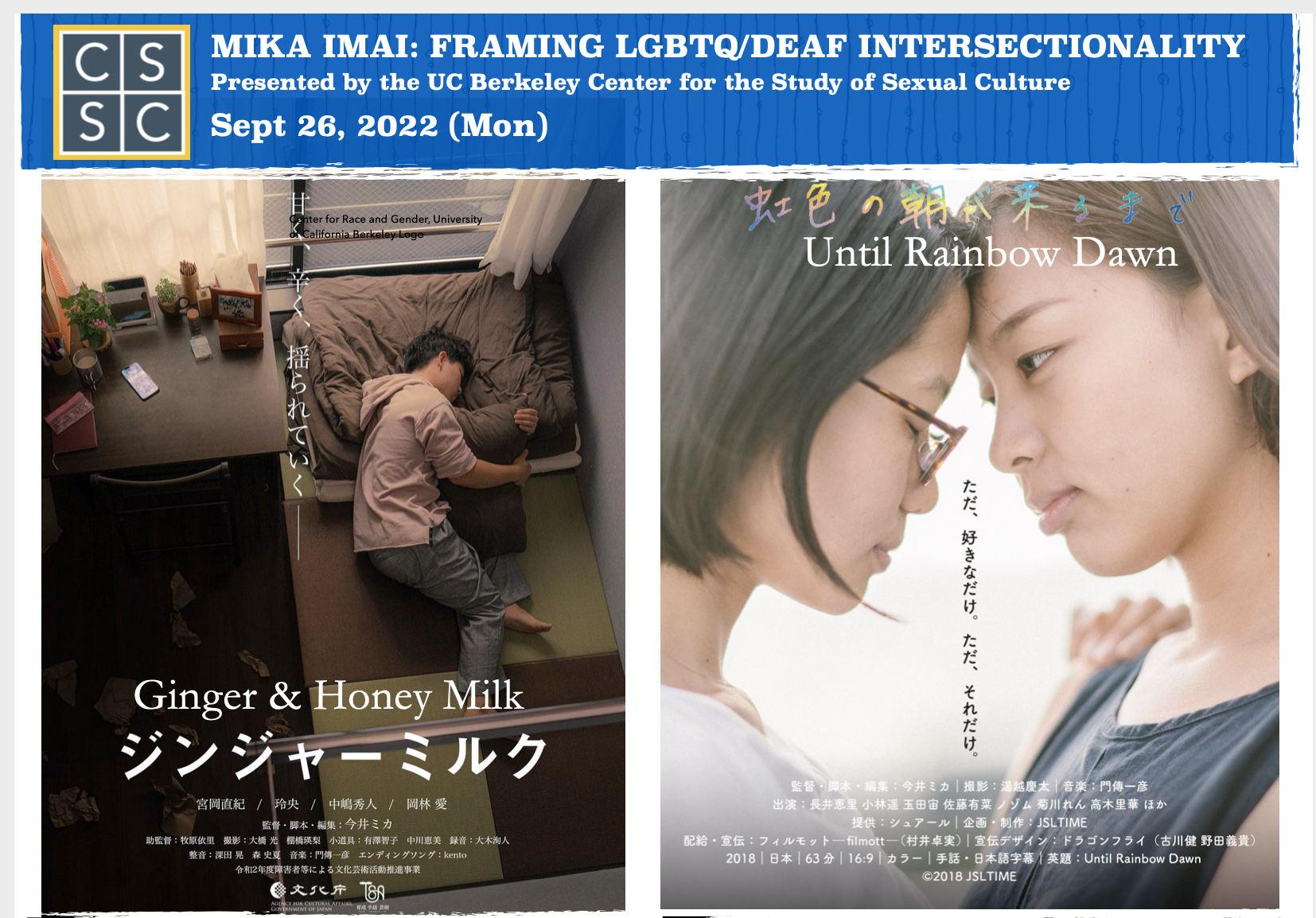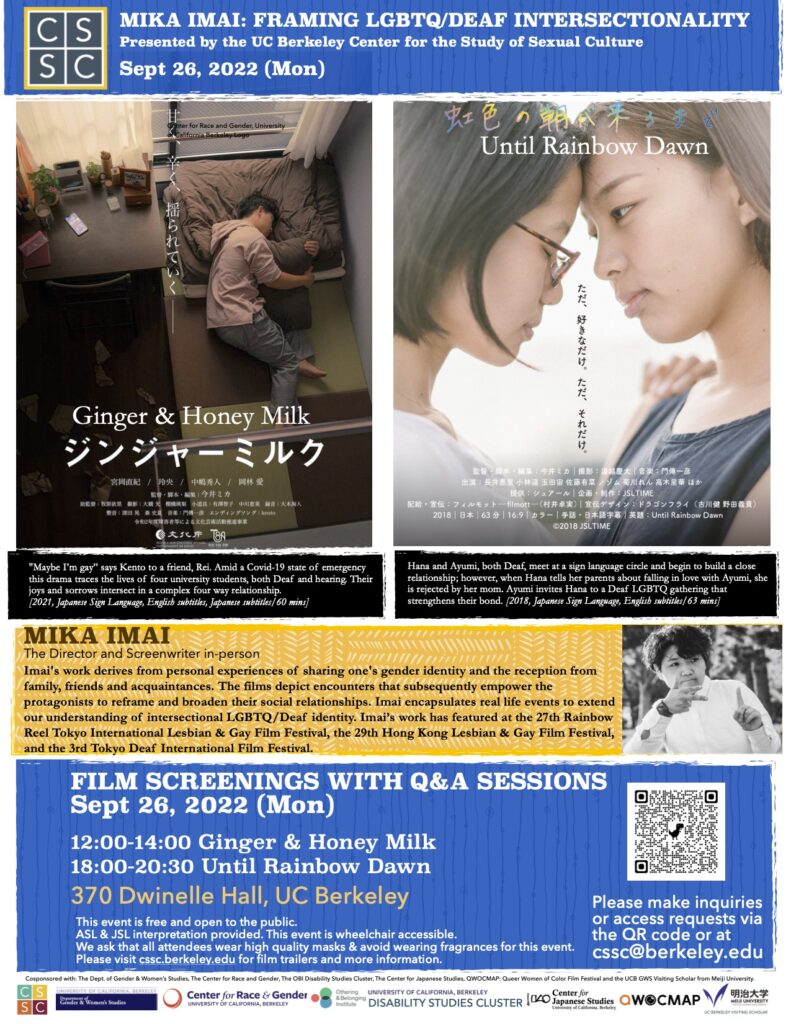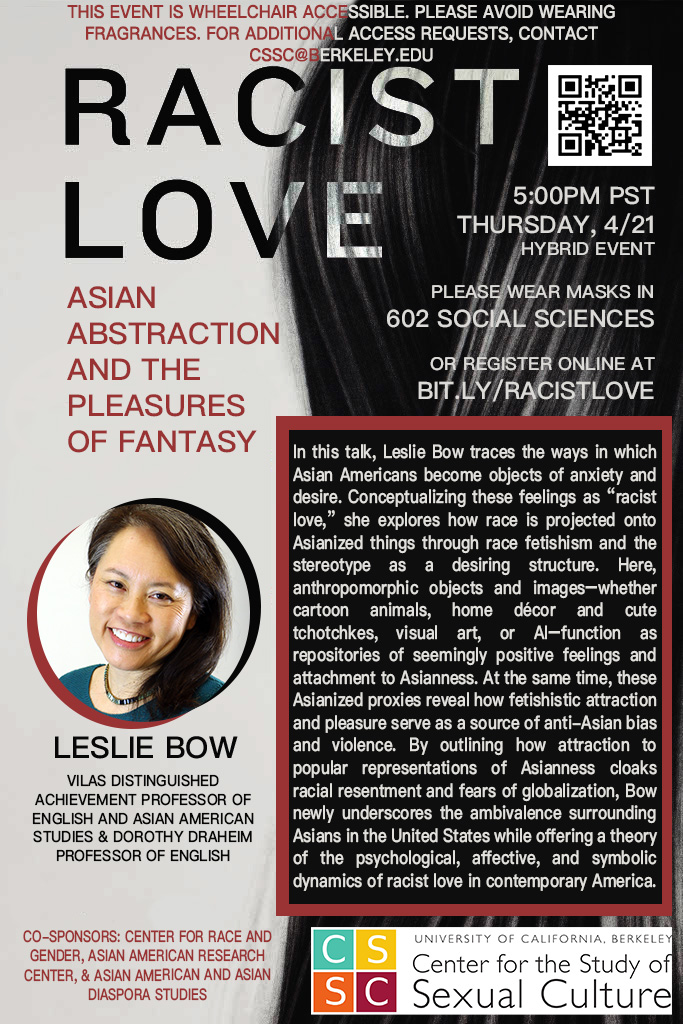2022

MIKA IMAI: Framing LGBTQ/DEAF Intersectionality
The UC Berkeley Center for the Study of Sexual Culture will feature the filmmaker Mika Imai from Japan, the creator of the LGBTQ/Deaf films Ginger and Honey Milk and Until Rainbow Dawn. Imai will screen the two films and participate in Q&A sessions.
Imai’s work derives from personal experiences of sharing one’s gender identity and the reception from family, friends and acquaintances. The films depict encounters that subsequently empower the protagonists to reframe and broaden their social relationships. Imai encapsulates real life events to extend our understanding of intersectional LGBTQ/Deaf identity. Imai’s work has featured at the 27th Rainbow Reel Tokyo International Lesbian & Gay Film Festival, the 29th Hong Kong Lesbian & Gay Film Festival, and the 3rd Tokyo Deaf International Film Festival.
FILM SCREENINGS WITH Q&A SESSIONS
Sept 26, 2022 (Mon)
12:00-14:00 Ginger & Honey Milk
18:00-20:30 Until Rainbow Dawn
Location:
370 Dwinelle Hall, UC Berkeley (Level F)
Directions to room 370 linked here
This event is free and open to the public.
ASL & Japanese Sign Language (JSL) interpretation provided.
This event is wheelchair accessible.
We ask that all attendees wear high quality masks and avoid wearing fragrances for this event whenever possible.
Please visit the CSSC NEWS page for film trailers and the Mika Imai LGBTER interview excerpts.
Ginger & Honey Milk
“Maybe I’m gay” says Kento to a friend, Rei. Amid a Covid-19 state of emergency this drama traces the lives of four university students, both Deaf and hearing. Their joys and sorrows intersect in a complex four way relationship.
[2021, Japanese Sign Language, English subtitles, Japanese subtitles/60 mins]
Until Rainbow Dawn
Hana and Ayumi, both Deaf, meet at a sign language circle and begin to build a close relationship; however, when Hana tells her parents about falling in love with Ayumi, she is rejected by her mom. Ayumi invites Hana to a Deaf LGBTQ gathering that strengthens their bond. [2018, Japanese Sign Language, English subtitles/63 mins]
Cosponsored with: The Dept. of Gender & Women’s Studies, The Center for Race and Gender, The Othering and Belonging Institute (OBI) Disability Studies Cluster, The Center for Japanese Studies, QWOCMAP: Queer Women of Color Media Arts Project, and the UC Berkeley GWS Visiting Scholar from Meiji University.
Please make inquires or access requests by email at cssc@berkeley.edu or via the QR code on the event poster.

There will be a Panel Discussion as part of the 18:00-20:00 Until Rainbow Dawn screening. The participants are listed below.
Bios of Today’s Panelists
Mika Imai has been filmmaking since the sixth grade and by sophomore year in high school was recognized with a best film award at the Yokohama Deaf Art Festival. In 2014 Imai received a best film award at the 2nd annual Irish Deaf Film Festival for the short film Sign Name Game. Imai’s earliest work relies upon visual action and Japanese Sign Language (JSL) as the vessels for expression. Imai’s first film to incorporate a soundtrack, Until Rainbow Dawn, debuted in 2019 at the 27th Rainbow Reel Tokyo International Lesbian and Gay Film Festival and featured at the 29th Hong Kong Lesbian and Gay Film Festival. Imai’s latest feature Ginger and Honey Milk premiered to a sold out audience at the 3rd Tokyo Deaf International Film Festival in 2021.
Imai produces a variety of entertainment such as the comedian duo “Deaf W”, and media such as “The Sign Language Picture Book of Living Creatures”, and in addition does video production work including commercials. Imai’s Youtube commercial for the Japan Foundation Phone relay service, “Never Give Up” premiered in March 2022 and in one month received over two million views.
Drago Rentería is a Deaf and disabled Chicano transgender elder and long-time LGBTQ/social justice activist, leader, and educator. Drago serves as Executive Director of Deaf Queer Resource Center, a national organization, based in San Francisco, for Deaf LGBTQ communities. He is also currently on the Transgender Law Center’s national Disability Project Advisory Board. In addition to his LGBTQ activism work, Drago is also a photojournalist and documentary photographer and uses his photography to bring more awareness to issues such as racism, housing injustice, police brutality, and gentrification. He is a graduate of UC Berkeley and did part of his undergrad work at Gallaudet University.
Karen Nakamura is the Haas Distinguished Chair of Disability Studies and Professor of Anthropology. She is a cultural and visual anthropologist and filmmaker whose research focuses on disability, sexuality, and minority social movements in contemporary Japan. Her first book, Deaf in Japan, was on sign language, identity, and deaf social movements. Her second book on schizophrenia and mental illness in Japan, entitled, A Disability of the Soul, was published in 2013 and was also accompanied by two films entitled Bethel: Community and Schizophrenia in Northern Japan and A Japanese Funeral. Her new project explores the intersections of disability, gender, and sexuality.
Johnny George is an Assistant Professor from Meiji University in the Department of Political Science and Economics. He is a Visiting Scholar in the Gender and Women’s Studies Department. His primary work focuses on the linguistics of Japanese Sign Language. He is currently working on a project examining the representation of Japanese Sign language and JSL users in film and media.
Mel Y. Chen (moderator, they/them/ta+) is the Richard and Rhoda Goldman Distinguished Chair in Undergraduate and Interdisciplinary Studies and Director of the Center for the Study of Sexual Culture, as well as the Disability Studies Minor. Mel hails from the Department of Gender and Women’s Studies and teaches and researches in areas including critical animal studies, language, trans studies, disability studies, sexuality and race, as well as in the arts. Mel’s first book, Animacies, is about colonial hierarchies of being. A second book is forthcoming in 2023, entitled Intoxicated: Race, Disability and Chemical Intimacies of Empire. Mel is also a member of a sustaining queer-trans of color arts group and is on the Board of Directors of the Queer Women of Color Media Arts Project.
Special thanks to:
Gillian Edgelow (Gender and Women’s Studies Administrator)
The event interpreters: Jennifer Mantle, Octavia Spiegel, Dane Lentz, Cassandra McAlmont, Megumi Kawakami, and Ikumi Kawamata
***POSTPONED*** “Racist Love: Asian Abstraction and the Pleasures of Fantasy”
We write to inform you that the hybrid event scheduled with Leslie Bow, “Racist Love,” at 5 PST has been postponed (both in person and online), with a new date to be determined.
We hope this finds you all safe. Some of you have registered from other locations and you may not have been informed of the distressing situation now happening at the UC Berkeley campus. Campus was under a shelter-in-place order from 9:30 this morning until just before 2 PM, with a distressed student potentially in a violent situation. We wanted to consult with Professor Bow about how/whether to go ahead with the event tonight. Certainly, the intensity of the situation on campus and the shut down of buildings obviated any in-person form of the event. But we were trying to decide whether to still go ahead with the online (Zoom) portion of the event with Professor Bow, given the great interest in her talk. We ended up having a deeply meaningful conversation about the relevance of her talk (which is, she shared, partly about what it means to insist on intellectual production under distress) to what was happening on campus and to the structures and presents fueling forms of distress, both of those locked in their buildings and of the student. As Professor Bow said, “there is a tragedy unfolding, we just don’t know whose yet.”
We do not make this decision lightly, and in mind of all those affected (some of whom were planning to come), we are trying our best to make it with care.
Please note that we are keeping this registrant list for the Zoom event, and you may note that we have temporarily moved the formal date/time of today’s Zoom meeting to 12 midnight on January 1, 2023 as a placeholder. This enables us to update you all of the new details once we have them.
Best wishes from us at CSSC and from Professor Bow, and do please stay tuned for a rescheduled date for a hybrid event in early fall 2022.

The Center for the Study of Sexual Culture is excited to welcome Prof. Leslie Bow (UW-Madison, English) to UC Berkeley on Thursday, April 21st at 5pm PST for a hybrid (in-person and on Zoom) event about her new book, Racist Love. Please join us with masks in 602 Social Sciences or register online at bit.ly/racistlove.
Leslie Bow is Vilas Distinguished Achievement Professor of English and Asian American Studies and Dorothy Draheim Professor of English at the University of Wisconsin-Madison. She is the author of the award-winning, ‘Partly Colored’: Asian Americans and Racial Anomaly in the Segregated South (New York University Press, 2010); Betrayal and Other Acts of Subversion: Feminism, Sexual Politics, Asian American Women’s Literature (Princeton University Press, 2001). Her co-edited volume, The Oxford Handbook of Twentieth-Century American Literature, is forthcoming with Oxford. Her new book, Racist Love: Asian Abstraction and the Pleasures of Fantasy, is just out with Duke University Press.
In Racist Love Leslie Bow traces the ways in which Asian Americans become objects of anxiety and desire. Conceptualizing these feelings as “racist love,” she explores how race is projected onto Asianized things through race fetishism and the stereotype as a desiring structure. Bow shows how anthropomorphic objects and images–whether cartoon animals, home décor and cute tchotchkes, contemporary visual art, or AI–function as repositories of seemingly positive feelings and attachment to Asianness. At the same time, Bow demonstrates that these Asianized proxies reveal how fetishistic attraction and pleasure serve as a source of anti-Asian bias and violence. By outlining how attraction to popular representations of Asianness cloaks racial resentment and fears of globalization, Bow provides a new means of understanding the ambivalence surrounding Asians in the United States while offering a theory of the psychological, affective, and symbolic dynamics of racist love in contemporary America.
This event is co-sponsored by the Center for Race and Gender, Asian American and Asian Diaspora Studies, and the Asian American Research Center at the Institute for the Study of Societal Issues.
This event is wheelchair accessible. Please avoid wearing fragrances, but please do wear masks. For additional access requests, contact cssc@berkeley.edu.
